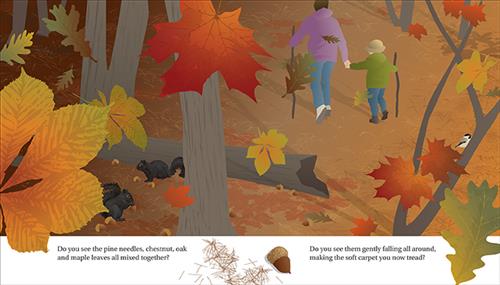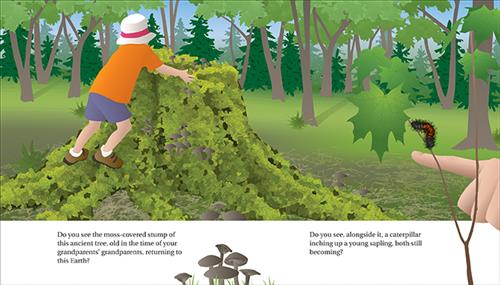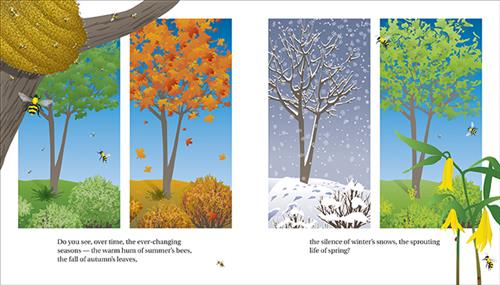Forest: A See to Learn Book is the first book in a series of non-fiction picture books for very young children, using lyrical phrasing to encourage a sensitive perception of the natural world and a caring connection with it.
Through gentle questions, the text asks young readers to consider what they see and experience in the forest through the seasons — animal tracks, tiny creatures in the soil, birds soaring in the sky above, towering trees, shade and dappled sunlight — drawing local connections alongside those of a global sensibility.
Stunningly beautiful illustrations show a child and grownup exploring the forest, appreciating its beauty, learning its secrets and enjoying moments of wonder, all first steps toward developing a lifelong awareness of our interconnectedness to the Earth and our impact on the environment.
Key Text Features
author’s note
Correlates to the Common Core State Standards in English Language Arts:
CCSS.ELA-LITERACY.RL.K.1
With prompting and support, ask and answer questions about key details in a text.
CCSS.ELA-LITERACY.RL.1.4
Identify words and phrases in stories or poems that suggest feelings or appeal to the senses.
CCSS.ELA-LITERACY.RL.1.5
Explain major differences between books that tell stories and books that give information, drawing on a wide reading of a range of text types.
Forest: A See to Learn Book is the first book in a series of non-fiction picture books for very young children, using lyrical phrasing to encourage a sensitive perception of the natural world and a caring connection with it.
Through gentle questions, the text asks young readers to consider what they see and experience in the forest through the seasons — animal tracks, tiny creatures in the soil, birds soaring in the sky above, towering trees, shade and dappled sunlight — drawing local connections alongside those of a global sensibility.
Stunningly beautiful illustrations show a child and grownup exploring the forest, appreciating its beauty, learning its secrets and enjoying moments of wonder, all first steps toward developing a lifelong awareness of our interconnectedness to the Earth and our impact on the environment.
Key Text Features
author’s note
Correlates to the Common Core State Standards in English Language Arts:
CCSS.ELA-LITERACY.RL.K.1
With prompting and support, ask and answer questions about key details in a text.
CCSS.ELA-LITERACY.RL.1.4
Identify words and phrases in stories or poems that suggest feelings or appeal to the senses.
CCSS.ELA-LITERACY.RL.1.5
Explain major differences between books that tell stories and books that give information, drawing on a wide reading of a range of text types.
| Published By | Groundwood Books Ltd — Mar 1, 2019 |
| Specifications | 24 pages | 8.75 in x 10 in |
| Keywords | seasonal changes; environmentalism; discovery and adventure; interconnectedness; sustainablity for kids; forest walk; forest ecosystem; ecology pedagogy; respect for environment; figurative language; imagery; metaphors; simile; questioning; Common Core aligned; CC Literature Key Ideas and Details; CC Literature Craft and Structure; kindergarten; grade 1; picture book; nonfiction; author's note; digital illustrations; |
| Written By |
KATE MOSS GAMBLIN was inspired to write the See to Learn series, including Forest: A See to Learn Book, following her doctoral research in sustainability learning, which uniquely combined a focus on environmental perception with an international comparative approach. She has international professional experience within education as well as climate change and environmental projects; her current focus is on enterprises involving sustainability, education and consulting. Kate lives in Toronto. |
| Illustrated by |
KAREN PATKAU has been writing and illustrating picture books, with a focus on nature and non-fiction, for more than thirty years. She won the Ezra Jack Keats Memorial Medal for her first book, Don’t Eat Spiders by Robert Heidbreder, and since then her titles have appeared on lists including Bank Street College of Education Best Children’s Books, Children’s Literature Roundtables of Canada Information Book Award finalists, Green Book Festival Award finalists, Ontario Library Association Best Bets and White Ravens selections. Karen has also illustrated Forest: A See to Learn Book. She lives in Toronto. |
| Written By |
|
KATE MOSS GAMBLIN was inspired to write the See to Learn series, including Forest: A See to Learn Book, following her doctoral research in sustainability learning, which uniquely combined a focus on environmental perception with an international comparative approach. She has international professional experience within education as well as climate change and environmental projects; her current focus is on enterprises involving sustainability, education and consulting. Kate lives in Toronto. |
| Illustrated by |
|
KAREN PATKAU has been writing and illustrating picture books, with a focus on nature and non-fiction, for more than thirty years. She won the Ezra Jack Keats Memorial Medal for her first book, Don’t Eat Spiders by Robert Heidbreder, and since then her titles have appeared on lists including Bank Street College of Education Best Children’s Books, Children’s Literature Roundtables of Canada Information Book Award finalists, Green Book Festival Award finalists, Ontario Library Association Best Bets and White Ravens selections. Karen has also illustrated Forest: A See to Learn Book. She lives in Toronto. |
| Audience | ages 4 to 7 / grades K to 2 |
| Reading Levels |
Lexile AD790L
Guided Reading L Fountas & Pinnel Text Level L |
| Key Text Features | author's note |
| Common Core |
CCSS.ELA-LITERACY.RL.K.1
CCSS.ELA-LITERACY.RL.1.5 CCSS.ELA-LITERACY.RL.1.4 |
“This first in the See to Learn series is ideal for starting a dialogue about the natural world both at home or in the classroom . . . that will lead children to form observations and questions of their own.” — Kirkus Reviews
“[T]his beautiful nonfiction picture book will be a useful jumping-off point for inquiry and land-based pedagogy. The illustrations are lush . . .” — School Library Journal




